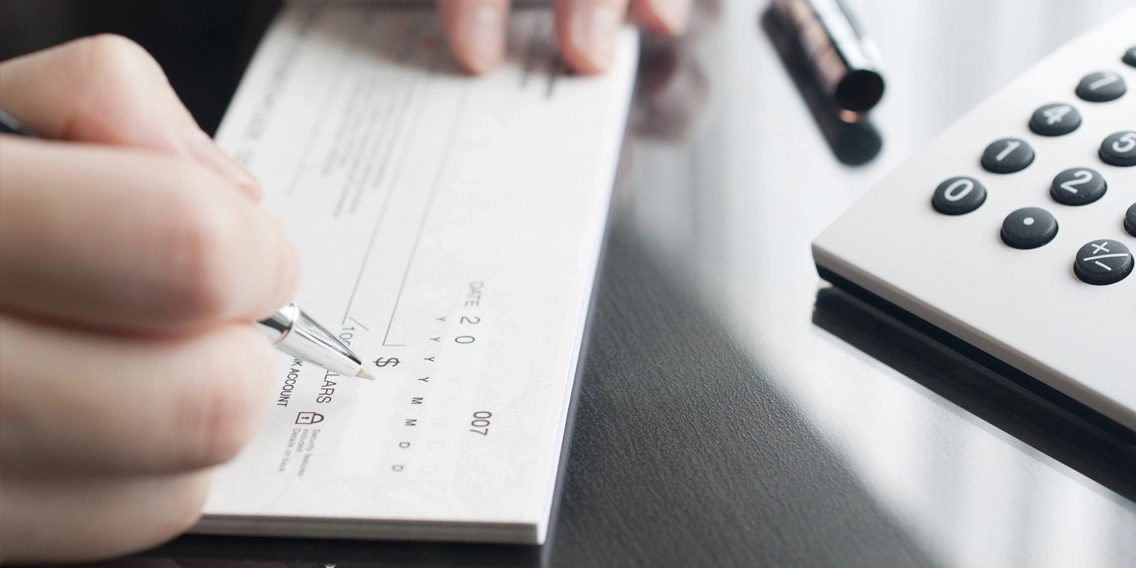CHECKING & SAVINGS
What is a Checking Account and How Does it Work?
EXPECTED READ TIME: 6 MINUTES
A checking account allows you to use direct deposit, pay with a debit card, and much more. Before choosing a checking account, you should take a closer look at what a checking account actually is and how it works.
What is a Checking Account?
A checking account is a vehicle for you to deposit and withdraw money that you consistently use for paying bills, making purchases, and more. Writing checks and using a debit card are the most common ways to access money in your account. You can open a checking account through a financial institution such as a credit union or bank.
Although you may need to go to a local credit union or bank for certain needs, online and mobile banking features offer 24/7 access to your checking account and make managing your money easier than ever. With some of these features, you can:
- Make mobile deposits
- Pay bills
- Transfer money
- Check your balance
- View transactions
Most checking accounts are also linked to a broad ATM network, so you can access your money while you're out and about. Just make sure your credit union or bank offers fee-free ATMs.
Types of Checking Accounts
Keep in mind, you're not limited to only one kind of checking account — you've got options. Take a closer look at some common types of accounts.
Standard Checking
If you just want basic functions, a standard checking account may be the choice for you. You can write checks, use your debit card, and access online and mobile banking with this type of account. Take note, you may have to keep a specific balance, so you're not charged a maintenance fee. Standard checking accounts generally either pay low interest or no interest at all.
Online Checking
Perhaps one of the most convenient perks of online checking is 24/7 access to your checking account. That means no more trying to run to the bank over your lunch hour or after work. You can simply manage your money from your computer or smartphone, whether you need to check your statement, make a transfer, or pay a bill. Plus, you can set up text or email alerts to notify you when bills are due or warn you when your balance is low.
Interest Checking
As the name suggests, with interest checking, you can earn dividends on your balance and help grow your account. Some financial institutions offer competitive rates for interest checking, depending on your account balance.
Student Checking
It's never too early to start developing smart financial habits, and student checking offers a way to do just that. Tailored to students from ages 17-24, student checking accounts usually have few fees or no fees at all.
Senior Checking
Also targeted to audiences of a certain age, senior checking accounts are often available for people age 55 or older. These accounts might also pay interest or dividends.
Rewards Checking
Much like a rewards credit card, a rewards checking account may help you earn points or cash back for everyday spending with your debit card. Some rewards accounts may also pay interest.
Credit Union Checking Accounts
Now that you know which type of account is best for you, the next question is where to go to get your account. One of the best options is a credit union. We'll explain why.
First, credit unions are not-for-profit financial institutions that are member-owned, and there are some credit unions anyone can join. With a focus on uniting people who share a common bond and providing exceptional customer service, credit unions thrive on the "People Helping People" ethos.
Some of the main perks of credit union checking accounts include:
- Higher dividends
- Fewer or lower fees
- Convenient online and mobile access
Credit unions are often able to offer these benefits because of their not-for-profit status, which means they don't have to pay federal income tax or shareholders. Instead, they can direct that money back toward member savings.
How Checking Accounts Work
Although people use debit cards more often than checks now, checking accounts originally functioned as a means to transfer your funds, via written check, to a recipient.
Let's say you wrote a check to your local internet provider to pay your monthly bill. Upon receipt of your check, the provider would deposit your check into the company's checking account. Then, the bank would process the transaction to officially withdraw the money from your checking account and credit it to the company's account.
There are several other ways to use a checking account that don't involve a paper check:
- Debit card: A debit card allows you to tap, insert, or swipe your card to make purchases in store. You can also use a debit card for online transactions and ATM withdrawals.
- Wire transfers: Wire transfers are typically used to send and receive large amounts of money.
- ACH transfers: These electronic transfers allow you to make one-time or recurring online bill payments from your checking account.
Remember, convenient features let your checking account do the heavy lifting for you. For example, mobile check deposits are especially handy because you can simply take a photo of your check with your smartphone and deposit it into your checking account without stepping foot into a bank or credit union.
Direct deposits also save you a trip to a branch. With this option, you can have your paycheck automatically deposited into your checking account every pay day.
Common Checking Account Fees
Even though many financial institutions offer free checking, you may potentially have to pay account fees under certain circumstances.
Monthly Maintenance Fee
Maintenance fees are charged by some financial institutions for holding an account with them. This fee may be waived by your financial institution if certain monthly requirements are met.
Approximate amount: $15.50 average in 2020
Overdraft Fee
Overdraft fees are issued when you don't have enough money in your checking account to cover a transaction.
Approximate amount: $33.47 average in 2020
ATM Fees
If you use an out-of-network ATM, you may be charged a fee by the company that runs the ATM and/or by your financial institution.
Approximate amount: $4.64 average in 2020
Check Ordering Fee
Your financial institution may send you a free box of checks when you open a checking account, but you'll likely be charged each time your reorder new checks.
Approximate amount: $11-$75 for two boxes, depending where you order checks and what style you choose
Inactivity Fee
This is a fee issued by your financial institution when you don't deposit or withdraw money from your account for a certain amount of time.
Approximate amount: $5-$20 per month
Again, check with your own financial institution to see if some of these fees may potentially be waived
Checking Account Safety
Keeping your money safe is a top priority for both banks and credit unions. One common factor is that both banks and credit unions insure deposits up to at least $250,000 per depositor or share owner, for each type of account owned, per each insured institution.
- The Federal Deposit Insurance Corporation (FDIC) insures most banks.
- The National Credit Union Administration (NCUA) insures all federal credit unions and some state credit unions.
Bottom line: If you have a checking account in an FDIC-insured bank or a NCUA-insured credit union, the insurer is guaranteed to pay you the money due from your account, up to that $250,000 limit, if the bank or credit union should go out of business.
Plus, both credit unions and banks take the strongest of measures to ensure customer and member security.
An Account That Meets Your Needs
Having quick, easy access to your account and convenient features to help you manage your money and stay financially aligned are musts when it comes to checking.
Being aware of different types of checking accounts that are available, potential fees, and security measures may help you filter your search to find an account that's in line with your goals.
Bank With Confidence
See the features and benefits of Access America Checking.




